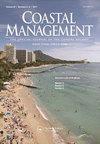尼日利亚拉各斯州马科科女渔民的挑战与前景
IF 1.9
4区 环境科学与生态学
Q4 ENVIRONMENTAL SCIENCES
引用次数: 4
摘要
摘要Makoko是尼日利亚拉各斯的一个沿海渔业社区,被恰当地描述为“非洲威尼斯”,也是世界上最大的浮动贫民窟。尽管在大多数沿海社区,妇女是支柱和事实上的户主,她们不得不在几乎没有或根本没有制度或文化支持的情况下提供和维持家庭,但女性渔民在手工渔业中的贡献很少受到赞赏。本文描述了拥有不同规模企业(小型、中型和大型)的妇女如何在从事鱼类贸易的同时发挥生育作用。主要调查结果表明,女性渔民以渔业为基础的生计的可持续性取决于营运资本和获得信贷的机会。社会网络和非正规信贷机构是获得资本的重要因素,妇女通过这些资本能够维持和扩大自己的企业。缺乏正规教育、获取信息的机会少、基于性别的歧视性规范和文化习俗对妇女生计的可持续性构成了挑战。本文提出了建立在现有社会网络和非正规信贷机构基础上的方法和干预措施,以提高妇女的经济贡献,减轻其渔业业务的限制。本文章由计算机程序翻译,如有差异,请以英文原文为准。
The Challenges and Prospects of Women Fisherfolk in Makoko, Lagos State, Nigeria
Abstract Makoko, a coastal fishing community in Lagos, Nigeria, aptly described as the "Venice of Africa", is also known as the world’s largest floating slum. Contributions of women fisherfolk in artisanal fisheries are seldom appreciated despite the fact that in most coastal communities, women are the pillars and de facto household- heads, having to provide and sustain their households with little or no institutional or cultural support. This paper describes how women with different sizes of businesses (small, medium and large) conducted their fish trade in conjunction with their reproductive roles. Key findings suggest that sustainability of fisheries-based livelihoods for women fisherfolk is determined by working capital and access to credit facilities. Social networks and informal credit institutions were important factors to obtain capital by which the women were able to sustain and expand their businesses. Lack of formal education, poor access to information, discriminatory gender–based norms and cultural practices challenged sustainability of the women’s livelihoods. This paper suggests approaches and interventions built on existing social networks and informal credit institutions to enhance women’s economic contributions and mitigate constraints in their fisheries businesses.
求助全文
通过发布文献求助,成功后即可免费获取论文全文。
去求助
来源期刊

Coastal Management
环境科学-环境科学
CiteScore
6.00
自引率
0.00%
发文量
24
审稿时长
>36 weeks
期刊介绍:
Coastal Management is an international peer-reviewed, applied research journal dedicated to exploring the technical, applied ecological, legal, political, social, and policy issues relating to the use of coastal and ocean resources and environments on a global scale. The journal presents timely information on management tools and techniques as well as recent findings from research and analysis that bear directly on management and policy. Findings must be grounded in the current peer reviewed literature and relevant studies. Articles must contain a clear and relevant management component. Preference is given to studies of interest to an international readership, but case studies are accepted if conclusions are derived from acceptable evaluative methods, reference to comparable cases, and related to peer reviewed studies.
 求助内容:
求助内容: 应助结果提醒方式:
应助结果提醒方式:


